Exploring the Societal Fascination with Serial Killers as Heroes
VerifiedAdded on 2023/06/04
|7
|1829
|466
Essay
AI Summary
This essay delves into the perplexing phenomenon of serial killers being portrayed as heroes in media and popular culture. It examines the psychological and sociological factors that contribute to this perception, referencing movies and literature such as 'Mr. Brooks,' 'Natural Born Killers,' 'Darkly Dreaming Dexter,' and 'Perfume: The Story of a Murderer.' The essay discusses how serial killers like Dexter Morgan, who target other criminals, can be seen as vigilantes, filling a void where the legal system fails. It also explores how the media's fascination with serial killers, driven by sensationalism and profit, contributes to their celebrity status. The essay concludes that this glorification stems from a societal attraction to the puzzle of human emotions and the desire to understand the motives behind these heinous acts, often overshadowing the victims and the true nature of their crimes. Desklib offers similar essays and study resources for students.
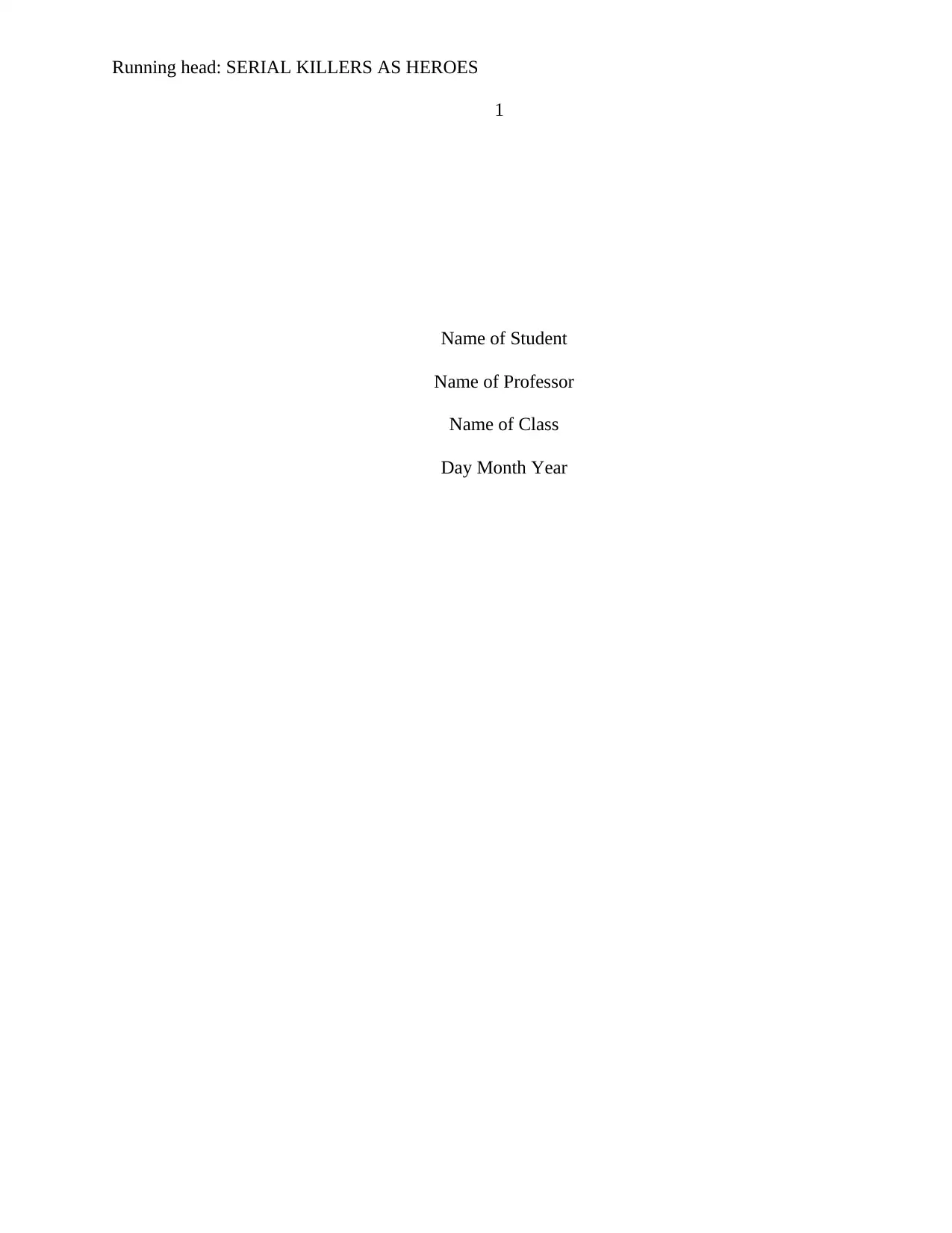
Running head: SERIAL KILLERS AS HEROES
1
Name of Student
Name of Professor
Name of Class
Day Month Year
1
Name of Student
Name of Professor
Name of Class
Day Month Year
Paraphrase This Document
Need a fresh take? Get an instant paraphrase of this document with our AI Paraphraser
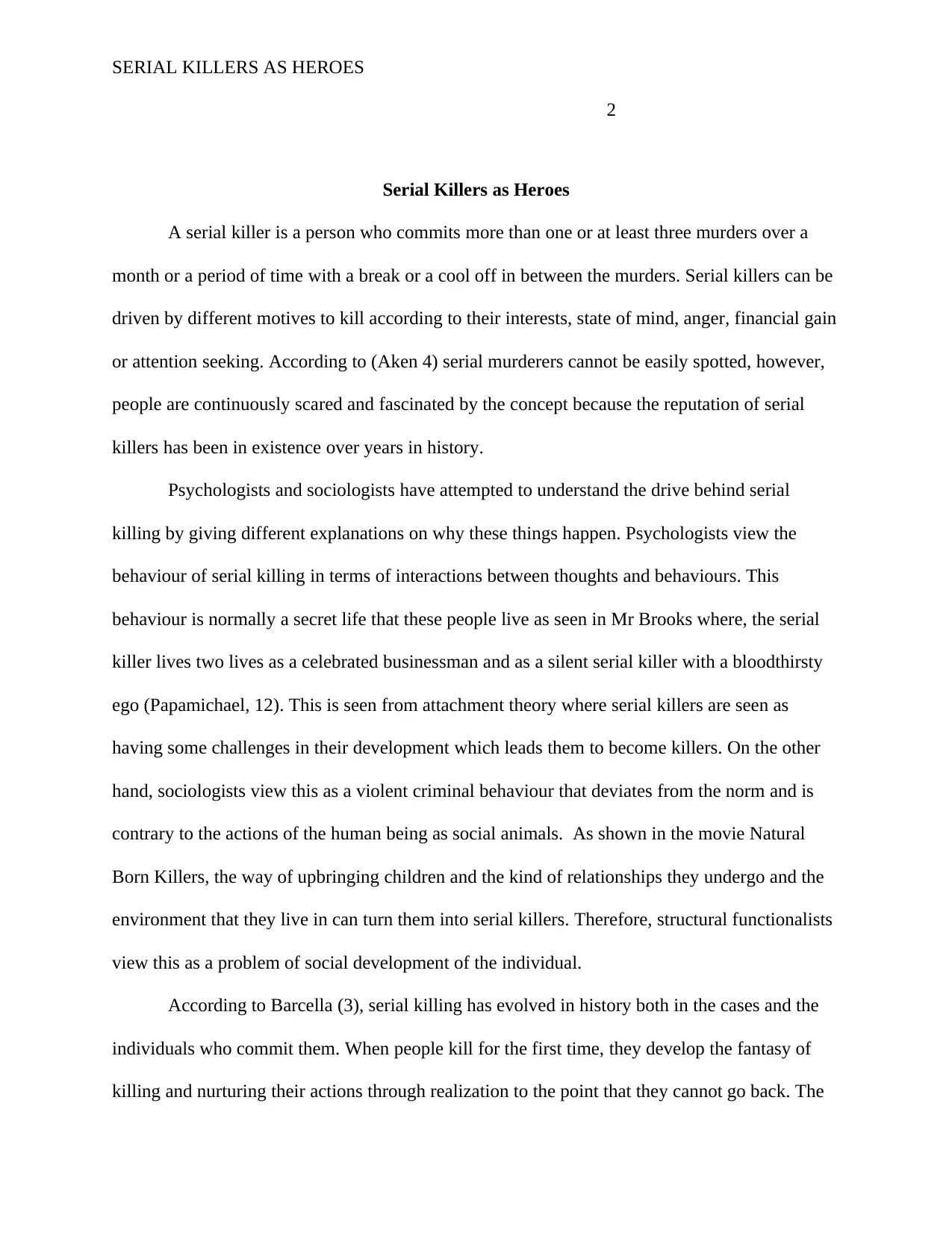
SERIAL KILLERS AS HEROES
2
Serial Killers as Heroes
A serial killer is a person who commits more than one or at least three murders over a
month or a period of time with a break or a cool off in between the murders. Serial killers can be
driven by different motives to kill according to their interests, state of mind, anger, financial gain
or attention seeking. According to (Aken 4) serial murderers cannot be easily spotted, however,
people are continuously scared and fascinated by the concept because the reputation of serial
killers has been in existence over years in history.
Psychologists and sociologists have attempted to understand the drive behind serial
killing by giving different explanations on why these things happen. Psychologists view the
behaviour of serial killing in terms of interactions between thoughts and behaviours. This
behaviour is normally a secret life that these people live as seen in Mr Brooks where, the serial
killer lives two lives as a celebrated businessman and as a silent serial killer with a bloodthirsty
ego (Papamichael, 12). This is seen from attachment theory where serial killers are seen as
having some challenges in their development which leads them to become killers. On the other
hand, sociologists view this as a violent criminal behaviour that deviates from the norm and is
contrary to the actions of the human being as social animals. As shown in the movie Natural
Born Killers, the way of upbringing children and the kind of relationships they undergo and the
environment that they live in can turn them into serial killers. Therefore, structural functionalists
view this as a problem of social development of the individual.
According to Barcella (3), serial killing has evolved in history both in the cases and the
individuals who commit them. When people kill for the first time, they develop the fantasy of
killing and nurturing their actions through realization to the point that they cannot go back. The
2
Serial Killers as Heroes
A serial killer is a person who commits more than one or at least three murders over a
month or a period of time with a break or a cool off in between the murders. Serial killers can be
driven by different motives to kill according to their interests, state of mind, anger, financial gain
or attention seeking. According to (Aken 4) serial murderers cannot be easily spotted, however,
people are continuously scared and fascinated by the concept because the reputation of serial
killers has been in existence over years in history.
Psychologists and sociologists have attempted to understand the drive behind serial
killing by giving different explanations on why these things happen. Psychologists view the
behaviour of serial killing in terms of interactions between thoughts and behaviours. This
behaviour is normally a secret life that these people live as seen in Mr Brooks where, the serial
killer lives two lives as a celebrated businessman and as a silent serial killer with a bloodthirsty
ego (Papamichael, 12). This is seen from attachment theory where serial killers are seen as
having some challenges in their development which leads them to become killers. On the other
hand, sociologists view this as a violent criminal behaviour that deviates from the norm and is
contrary to the actions of the human being as social animals. As shown in the movie Natural
Born Killers, the way of upbringing children and the kind of relationships they undergo and the
environment that they live in can turn them into serial killers. Therefore, structural functionalists
view this as a problem of social development of the individual.
According to Barcella (3), serial killing has evolved in history both in the cases and the
individuals who commit them. When people kill for the first time, they develop the fantasy of
killing and nurturing their actions through realization to the point that they cannot go back. The
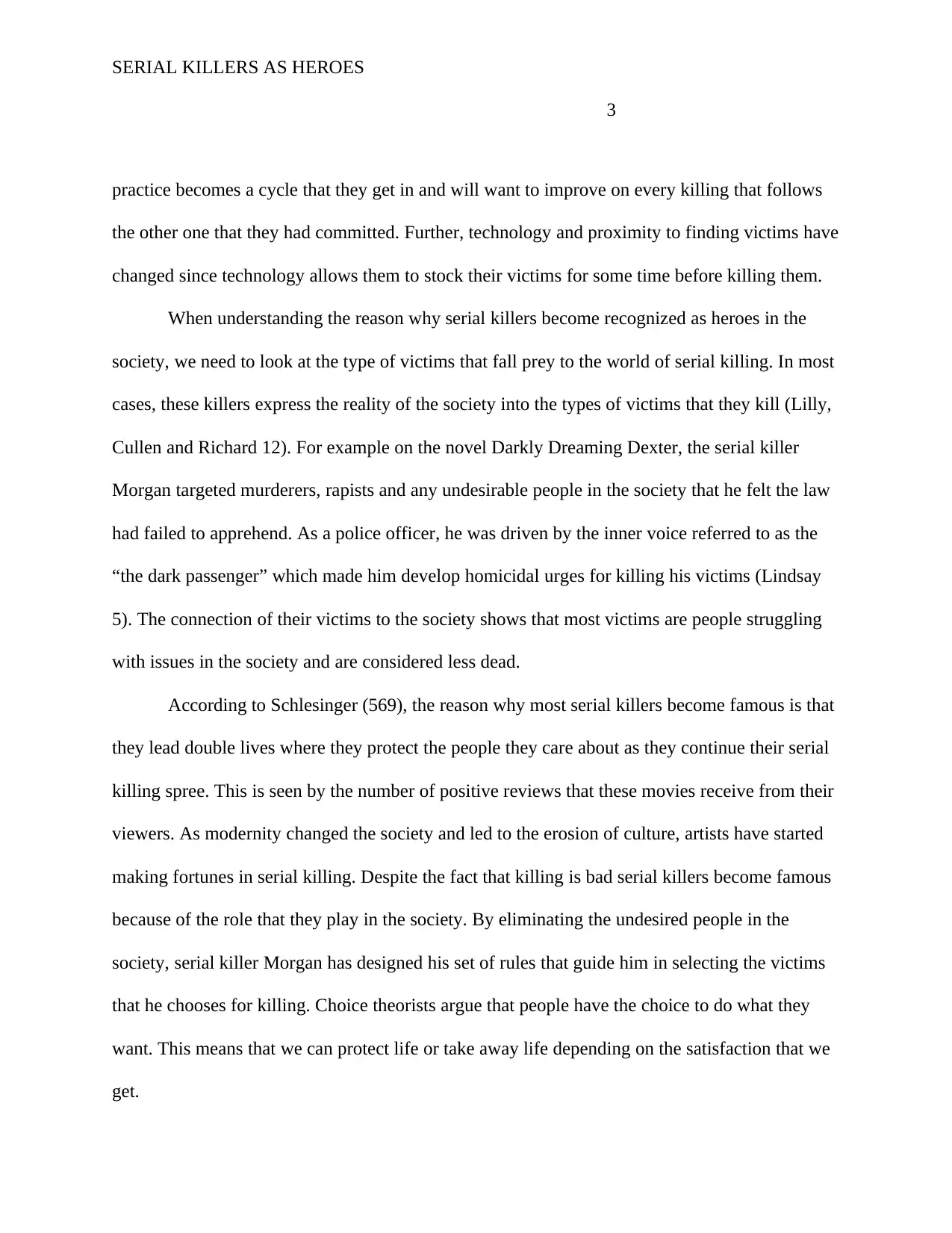
SERIAL KILLERS AS HEROES
3
practice becomes a cycle that they get in and will want to improve on every killing that follows
the other one that they had committed. Further, technology and proximity to finding victims have
changed since technology allows them to stock their victims for some time before killing them.
When understanding the reason why serial killers become recognized as heroes in the
society, we need to look at the type of victims that fall prey to the world of serial killing. In most
cases, these killers express the reality of the society into the types of victims that they kill (Lilly,
Cullen and Richard 12). For example on the novel Darkly Dreaming Dexter, the serial killer
Morgan targeted murderers, rapists and any undesirable people in the society that he felt the law
had failed to apprehend. As a police officer, he was driven by the inner voice referred to as the
“the dark passenger” which made him develop homicidal urges for killing his victims (Lindsay
5). The connection of their victims to the society shows that most victims are people struggling
with issues in the society and are considered less dead.
According to Schlesinger (569), the reason why most serial killers become famous is that
they lead double lives where they protect the people they care about as they continue their serial
killing spree. This is seen by the number of positive reviews that these movies receive from their
viewers. As modernity changed the society and led to the erosion of culture, artists have started
making fortunes in serial killing. Despite the fact that killing is bad serial killers become famous
because of the role that they play in the society. By eliminating the undesired people in the
society, serial killer Morgan has designed his set of rules that guide him in selecting the victims
that he chooses for killing. Choice theorists argue that people have the choice to do what they
want. This means that we can protect life or take away life depending on the satisfaction that we
get.
3
practice becomes a cycle that they get in and will want to improve on every killing that follows
the other one that they had committed. Further, technology and proximity to finding victims have
changed since technology allows them to stock their victims for some time before killing them.
When understanding the reason why serial killers become recognized as heroes in the
society, we need to look at the type of victims that fall prey to the world of serial killing. In most
cases, these killers express the reality of the society into the types of victims that they kill (Lilly,
Cullen and Richard 12). For example on the novel Darkly Dreaming Dexter, the serial killer
Morgan targeted murderers, rapists and any undesirable people in the society that he felt the law
had failed to apprehend. As a police officer, he was driven by the inner voice referred to as the
“the dark passenger” which made him develop homicidal urges for killing his victims (Lindsay
5). The connection of their victims to the society shows that most victims are people struggling
with issues in the society and are considered less dead.
According to Schlesinger (569), the reason why most serial killers become famous is that
they lead double lives where they protect the people they care about as they continue their serial
killing spree. This is seen by the number of positive reviews that these movies receive from their
viewers. As modernity changed the society and led to the erosion of culture, artists have started
making fortunes in serial killing. Despite the fact that killing is bad serial killers become famous
because of the role that they play in the society. By eliminating the undesired people in the
society, serial killer Morgan has designed his set of rules that guide him in selecting the victims
that he chooses for killing. Choice theorists argue that people have the choice to do what they
want. This means that we can protect life or take away life depending on the satisfaction that we
get.
⊘ This is a preview!⊘
Do you want full access?
Subscribe today to unlock all pages.

Trusted by 1+ million students worldwide
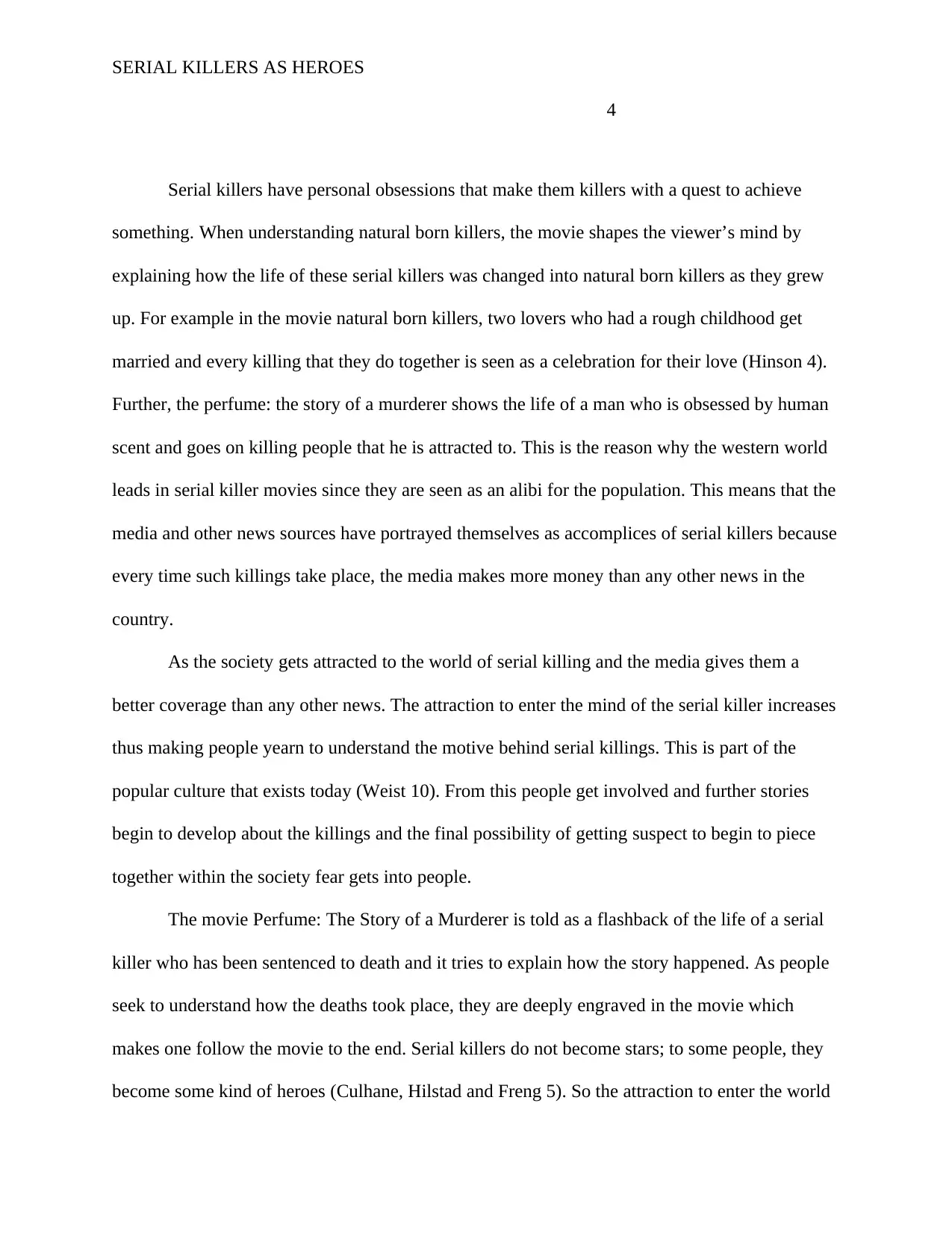
SERIAL KILLERS AS HEROES
4
Serial killers have personal obsessions that make them killers with a quest to achieve
something. When understanding natural born killers, the movie shapes the viewer’s mind by
explaining how the life of these serial killers was changed into natural born killers as they grew
up. For example in the movie natural born killers, two lovers who had a rough childhood get
married and every killing that they do together is seen as a celebration for their love (Hinson 4).
Further, the perfume: the story of a murderer shows the life of a man who is obsessed by human
scent and goes on killing people that he is attracted to. This is the reason why the western world
leads in serial killer movies since they are seen as an alibi for the population. This means that the
media and other news sources have portrayed themselves as accomplices of serial killers because
every time such killings take place, the media makes more money than any other news in the
country.
As the society gets attracted to the world of serial killing and the media gives them a
better coverage than any other news. The attraction to enter the mind of the serial killer increases
thus making people yearn to understand the motive behind serial killings. This is part of the
popular culture that exists today (Weist 10). From this people get involved and further stories
begin to develop about the killings and the final possibility of getting suspect to begin to piece
together within the society fear gets into people.
The movie Perfume: The Story of a Murderer is told as a flashback of the life of a serial
killer who has been sentenced to death and it tries to explain how the story happened. As people
seek to understand how the deaths took place, they are deeply engraved in the movie which
makes one follow the movie to the end. Serial killers do not become stars; to some people, they
become some kind of heroes (Culhane, Hilstad and Freng 5). So the attraction to enter the world
4
Serial killers have personal obsessions that make them killers with a quest to achieve
something. When understanding natural born killers, the movie shapes the viewer’s mind by
explaining how the life of these serial killers was changed into natural born killers as they grew
up. For example in the movie natural born killers, two lovers who had a rough childhood get
married and every killing that they do together is seen as a celebration for their love (Hinson 4).
Further, the perfume: the story of a murderer shows the life of a man who is obsessed by human
scent and goes on killing people that he is attracted to. This is the reason why the western world
leads in serial killer movies since they are seen as an alibi for the population. This means that the
media and other news sources have portrayed themselves as accomplices of serial killers because
every time such killings take place, the media makes more money than any other news in the
country.
As the society gets attracted to the world of serial killing and the media gives them a
better coverage than any other news. The attraction to enter the mind of the serial killer increases
thus making people yearn to understand the motive behind serial killings. This is part of the
popular culture that exists today (Weist 10). From this people get involved and further stories
begin to develop about the killings and the final possibility of getting suspect to begin to piece
together within the society fear gets into people.
The movie Perfume: The Story of a Murderer is told as a flashback of the life of a serial
killer who has been sentenced to death and it tries to explain how the story happened. As people
seek to understand how the deaths took place, they are deeply engraved in the movie which
makes one follow the movie to the end. Serial killers do not become stars; to some people, they
become some kind of heroes (Culhane, Hilstad and Freng 5). So the attraction to enter the world
Paraphrase This Document
Need a fresh take? Get an instant paraphrase of this document with our AI Paraphraser
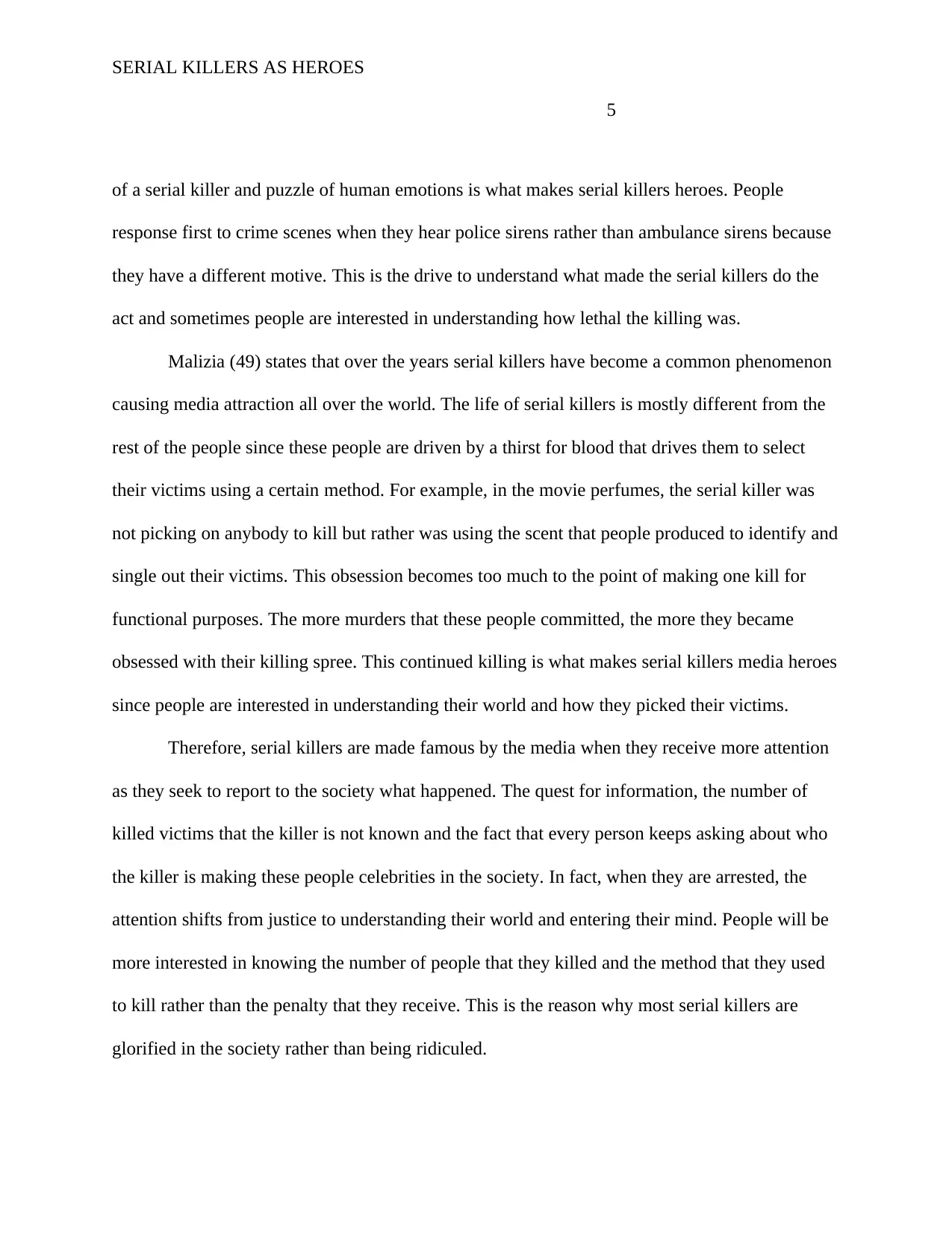
SERIAL KILLERS AS HEROES
5
of a serial killer and puzzle of human emotions is what makes serial killers heroes. People
response first to crime scenes when they hear police sirens rather than ambulance sirens because
they have a different motive. This is the drive to understand what made the serial killers do the
act and sometimes people are interested in understanding how lethal the killing was.
Malizia (49) states that over the years serial killers have become a common phenomenon
causing media attraction all over the world. The life of serial killers is mostly different from the
rest of the people since these people are driven by a thirst for blood that drives them to select
their victims using a certain method. For example, in the movie perfumes, the serial killer was
not picking on anybody to kill but rather was using the scent that people produced to identify and
single out their victims. This obsession becomes too much to the point of making one kill for
functional purposes. The more murders that these people committed, the more they became
obsessed with their killing spree. This continued killing is what makes serial killers media heroes
since people are interested in understanding their world and how they picked their victims.
Therefore, serial killers are made famous by the media when they receive more attention
as they seek to report to the society what happened. The quest for information, the number of
killed victims that the killer is not known and the fact that every person keeps asking about who
the killer is making these people celebrities in the society. In fact, when they are arrested, the
attention shifts from justice to understanding their world and entering their mind. People will be
more interested in knowing the number of people that they killed and the method that they used
to kill rather than the penalty that they receive. This is the reason why most serial killers are
glorified in the society rather than being ridiculed.
5
of a serial killer and puzzle of human emotions is what makes serial killers heroes. People
response first to crime scenes when they hear police sirens rather than ambulance sirens because
they have a different motive. This is the drive to understand what made the serial killers do the
act and sometimes people are interested in understanding how lethal the killing was.
Malizia (49) states that over the years serial killers have become a common phenomenon
causing media attraction all over the world. The life of serial killers is mostly different from the
rest of the people since these people are driven by a thirst for blood that drives them to select
their victims using a certain method. For example, in the movie perfumes, the serial killer was
not picking on anybody to kill but rather was using the scent that people produced to identify and
single out their victims. This obsession becomes too much to the point of making one kill for
functional purposes. The more murders that these people committed, the more they became
obsessed with their killing spree. This continued killing is what makes serial killers media heroes
since people are interested in understanding their world and how they picked their victims.
Therefore, serial killers are made famous by the media when they receive more attention
as they seek to report to the society what happened. The quest for information, the number of
killed victims that the killer is not known and the fact that every person keeps asking about who
the killer is making these people celebrities in the society. In fact, when they are arrested, the
attention shifts from justice to understanding their world and entering their mind. People will be
more interested in knowing the number of people that they killed and the method that they used
to kill rather than the penalty that they receive. This is the reason why most serial killers are
glorified in the society rather than being ridiculed.
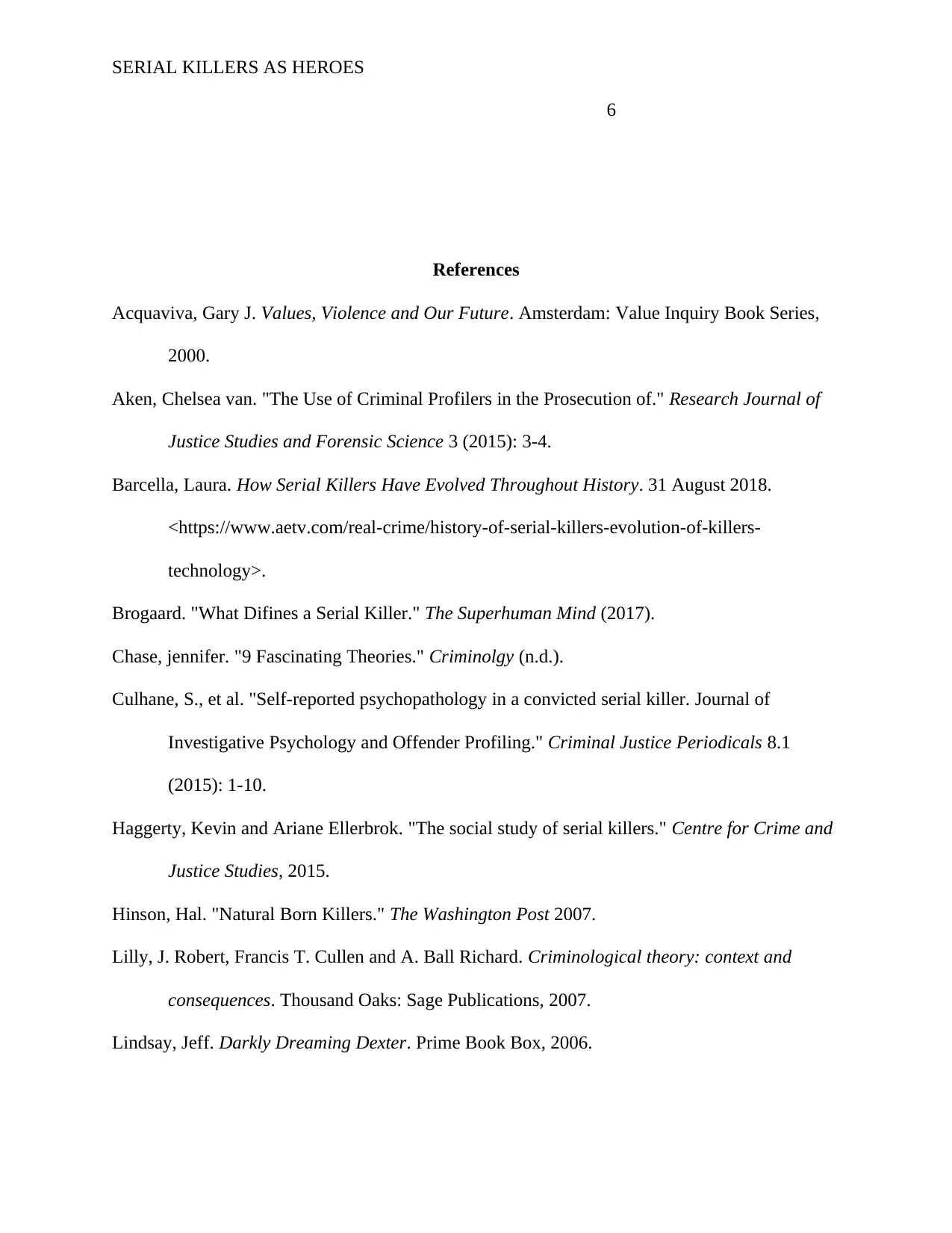
SERIAL KILLERS AS HEROES
6
References
Acquaviva, Gary J. Values, Violence and Our Future. Amsterdam: Value Inquiry Book Series,
2000.
Aken, Chelsea van. "The Use of Criminal Profilers in the Prosecution of." Research Journal of
Justice Studies and Forensic Science 3 (2015): 3-4.
Barcella, Laura. How Serial Killers Have Evolved Throughout History. 31 August 2018.
<https://www.aetv.com/real-crime/history-of-serial-killers-evolution-of-killers-
technology>.
Brogaard. "What Difines a Serial Killer." The Superhuman Mind (2017).
Chase, jennifer. "9 Fascinating Theories." Criminolgy (n.d.).
Culhane, S., et al. "Self-reported psychopathology in a convicted serial killer. Journal of
Investigative Psychology and Offender Profiling." Criminal Justice Periodicals 8.1
(2015): 1-10.
Haggerty, Kevin and Ariane Ellerbrok. "The social study of serial killers." Centre for Crime and
Justice Studies, 2015.
Hinson, Hal. "Natural Born Killers." The Washington Post 2007.
Lilly, J. Robert, Francis T. Cullen and A. Ball Richard. Criminological theory: context and
consequences. Thousand Oaks: Sage Publications, 2007.
Lindsay, Jeff. Darkly Dreaming Dexter. Prime Book Box, 2006.
6
References
Acquaviva, Gary J. Values, Violence and Our Future. Amsterdam: Value Inquiry Book Series,
2000.
Aken, Chelsea van. "The Use of Criminal Profilers in the Prosecution of." Research Journal of
Justice Studies and Forensic Science 3 (2015): 3-4.
Barcella, Laura. How Serial Killers Have Evolved Throughout History. 31 August 2018.
<https://www.aetv.com/real-crime/history-of-serial-killers-evolution-of-killers-
technology>.
Brogaard. "What Difines a Serial Killer." The Superhuman Mind (2017).
Chase, jennifer. "9 Fascinating Theories." Criminolgy (n.d.).
Culhane, S., et al. "Self-reported psychopathology in a convicted serial killer. Journal of
Investigative Psychology and Offender Profiling." Criminal Justice Periodicals 8.1
(2015): 1-10.
Haggerty, Kevin and Ariane Ellerbrok. "The social study of serial killers." Centre for Crime and
Justice Studies, 2015.
Hinson, Hal. "Natural Born Killers." The Washington Post 2007.
Lilly, J. Robert, Francis T. Cullen and A. Ball Richard. Criminological theory: context and
consequences. Thousand Oaks: Sage Publications, 2007.
Lindsay, Jeff. Darkly Dreaming Dexter. Prime Book Box, 2006.
⊘ This is a preview!⊘
Do you want full access?
Subscribe today to unlock all pages.

Trusted by 1+ million students worldwide
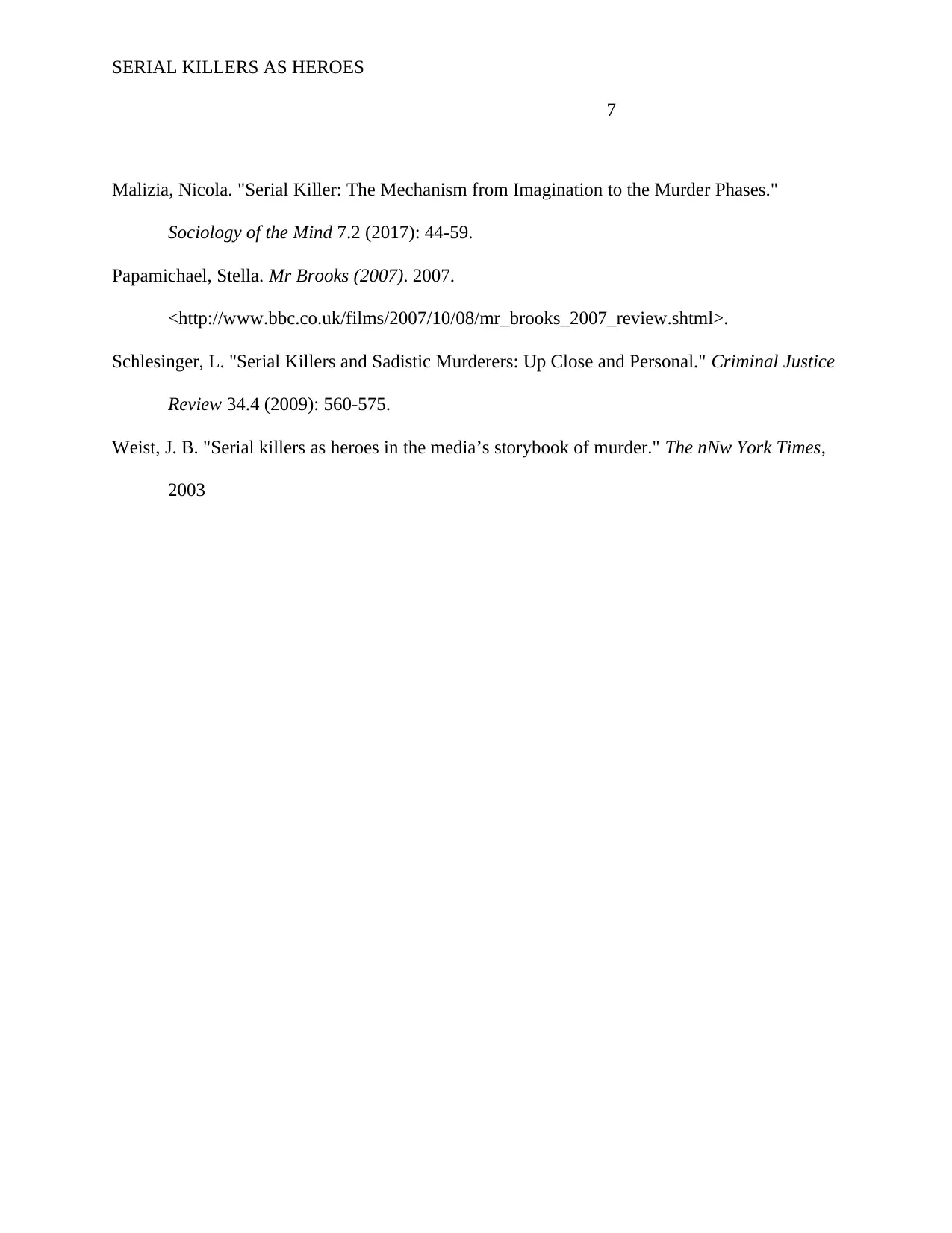
SERIAL KILLERS AS HEROES
7
Malizia, Nicola. "Serial Killer: The Mechanism from Imagination to the Murder Phases."
Sociology of the Mind 7.2 (2017): 44-59.
Papamichael, Stella. Mr Brooks (2007). 2007.
<http://www.bbc.co.uk/films/2007/10/08/mr_brooks_2007_review.shtml>.
Schlesinger, L. "Serial Killers and Sadistic Murderers: Up Close and Personal." Criminal Justice
Review 34.4 (2009): 560-575.
Weist, J. B. "Serial killers as heroes in the media’s storybook of murder." The nNw York Times,
2003
7
Malizia, Nicola. "Serial Killer: The Mechanism from Imagination to the Murder Phases."
Sociology of the Mind 7.2 (2017): 44-59.
Papamichael, Stella. Mr Brooks (2007). 2007.
<http://www.bbc.co.uk/films/2007/10/08/mr_brooks_2007_review.shtml>.
Schlesinger, L. "Serial Killers and Sadistic Murderers: Up Close and Personal." Criminal Justice
Review 34.4 (2009): 560-575.
Weist, J. B. "Serial killers as heroes in the media’s storybook of murder." The nNw York Times,
2003
1 out of 7
Related Documents
Your All-in-One AI-Powered Toolkit for Academic Success.
+13062052269
info@desklib.com
Available 24*7 on WhatsApp / Email
![[object Object]](/_next/static/media/star-bottom.7253800d.svg)
Unlock your academic potential
Copyright © 2020–2026 A2Z Services. All Rights Reserved. Developed and managed by ZUCOL.





